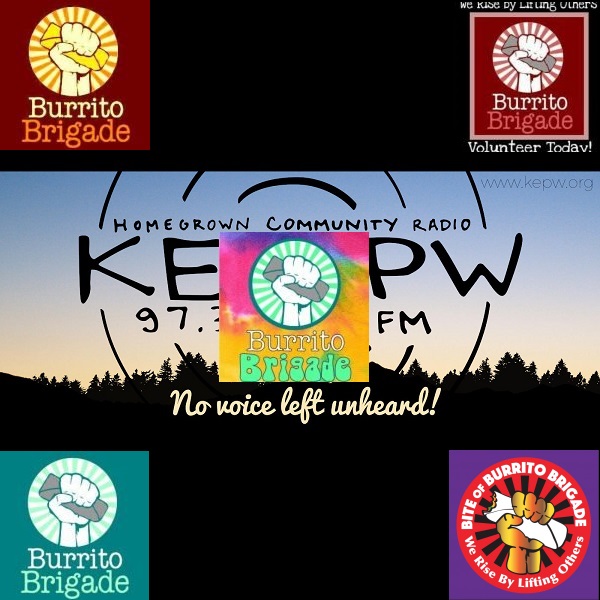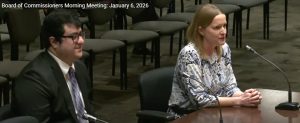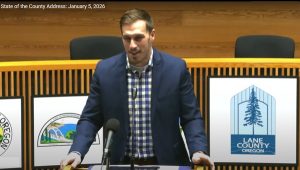Burrito Brigade: Feeding the whole community
5 min read
A radical question for Burrito Brigade Executive Director Jennifer Densen: In the event of a natural disaster or general strike, could Burrito Brigades feed the whole community?
[00:00:13] DJ Suss D (KEPW News): Burrito Brigade started in 2014 and has hand-delivered thousands of nutritious vegan meals to hungry individuals in Eugene and Springfield. Burrito Brigade targets two of the most insecure food days, Saturday and Sunday. Their unique distribution model delivers a hot meal directly to the hungry via foot bike and automobile. Alright, I’m here talking with:
[00:00:34] Jennifer Denson (Burrito Brigade): Jennifer Denson.
[00:00:35] DJ Suss D: With Burrito Brigade. How did Burrito Brigade start?
[00:00:38] Jennifer Denson: We started in 2014 when we saw the need of a hot meal or food access on the weekend. We started out with one day a week. We quickly grew into two days a week. We have now made close to 303,000 meals to date, and over 12,000 volunteers that have participated.
[00:01:04] DJ Suss D: Was it you that started it or…?
[00:01:06] Jennifer Denson: No, I answered a Facebook ad and was interested in getting involved and I was instantly hooked.
[00:01:13] DJ Suss D: And we’re here at Food for Lane County. Was it always here, wasn’t it in a house like Food Not Bombs?
[00:01:18] Jennifer Denson: Correct. In the beginning it was started in a house and then we started using churches and then COVID hit and both of those churches shut down. So then we’ve been essentially at Food for Lane County since the beginning of the pandemic.
[00:01:32] Our kitchen should be finished in our building in a few months. So then all of our projects will be under one roof.
[00:01:39] DJ Suss D: Oh, so you’re going to move from Food for Lane County.
[00:01:42] Jennifer Denson: Correct, we’re, Food for Lane County is temporary.
[00:01:45] DJ Suss D: All right. And you, I noticed you have drops—these drop boxes around town?
[00:01:50] Jennifer Denson: The Little Free Pantries are also our project, on Saturday and Sunday. The ones closest to the Whit, the Whiteaker area, get fresh burritos and then there’s 55 of them across town that are neighbors helping neighbors. So if you have a can of food, excess in your pantry and you can drop one off and another family can take it.
[00:02:13] DJ Suss D: I noticed you have a thing on Facebook that is making it easier to volunteer.
[00:02:20] Jennifer Denson: Yes. We’re now using Signup Genius on our website so that you can pick a weekend that you want to get involved and just sign up.
[00:02:29] DJ Suss D: But you’re getting enough people or I mean—
[00:02:31] Jennifer Denson: Oh, yeah (volunteers). It’s always a great turnout and it’s a great time.
[00:02:36] DJ Suss D: And anybody can get the food too. It’s not just religious people or, yeah, yeah.
[00:02:42] Jennifer Denson: All are welcome. All are welcome. Always. We’ve always been no questions asked, pretty much, from the beginning, it was, ‘Do you want a free burrito?’ And then our Little Free Pantries are just free food, no questions asked.
[00:02:56] DJ Suss D: All right. And so what is the general situation with the homeless? What can you tell me, how people are fed in this town?
[00:03:04] Jennifer Denson: There is still very little access on the weekends. There are quite a few organizations locally that rely on our burritos. We service White Bird, the Service Station, First Place Family Center, and then usually five or six of our pantries in the Whiteaker.
[00:03:23] DJ Suss D: All right. So what do you think it’s going to need to get people fed?
[00:03:27] Jennifer Denson: I think, you know, it’s just community, we still have got to look out for our neighbors. And doesn’t matter if they don’t have a house, they still deserve to be fed. And food is a human right.
[00:03:39] DJ Suss D: So a top-down approach: what about legislation and Congress and (oh—) the government.
[00:03:45] Jennifer Denson: Oh, that’s out of my scope. I like to be on the ground and, I’m not sure, politically-wise, something’s got to change, but I’m not sure—
[00:03:57] DJ Suss D: Well, so you’re not going to wait for them to do it?
[00:04:00] Jennifer Denson: No, no. (You’re, you’re getting with your) feeding and doing what I do best.
[00:04:04] DJ Suss D: And so it’s more important to get with your neighbors, (Yeah, yeah) is the way we’re going to solve this.
[00:04:08] Jennifer Denson: I think, yeah. Working together for the greater good.
[00:04:13] DJ Suss D: How do you start a Burrito Brigade in your community?
[00:04:16] Jennifer Denson: We have a kind of a recipe start and so if somebody in another city wants to reach out, we have the startup kind of booklet. But it’s really easy, ‘cause once you get people involved, they see how easy this is, and what a fun time we have.
[00:04:34] DJ Suss D: All right, so here’s the radical question. (Okay.) So we’re, so there’s a lot of people in town that are, a lot of groups would say that we need a general strike to get to, get things done. Would you guys be there for a general strike? Are you capable of feeding people if that were to happen?
[00:04:52] Jennifer Denson: Probably not, probably because we’re still, you know, we’re trying to do what we do best, which is kind of low-scale. And I don’t know if that would be, I can’t say that that would be in our wheelhouse, but maybe.
[00:05:06] DJ Suss D: But you’re not against it?
[00:05:08] Jennifer Denson: Not totally.
[00:05:10] DJ Suss D: And could that be potentially where this would go? I mean, I’m talking about mutual aid and things like that. You fall into that category of mutual aid. (Yes.) And someday, maybe it could be used for social change…?
[00:05:24] Jennifer Denson: Maybe.
[00:05:25] DJ Suss D: Their motto is: ‘Take what you need, give what you can.’ It’s all about neighbors helping neighbors.
[00:05:29] If you’re interested in: hosting a pantry; helping make sure they stay well-stocked; or are in need of food; or want to get involved otherwise; or want to donate food, go to BurritoBrigade.org.
[00:05:43] For KEPW News, I’m DJ Suss D.
The Food Safety Self-Training Manual is available in Arabic, Chinese (simplified), Chinese (traditional), Chuukese, English, French, Japanese, Khmer, Korean, Laotian, Nepali, Romanian, Russian, Somali, Spanish, Tagalog, Thai, Ukrainian, and Vietnamese.



